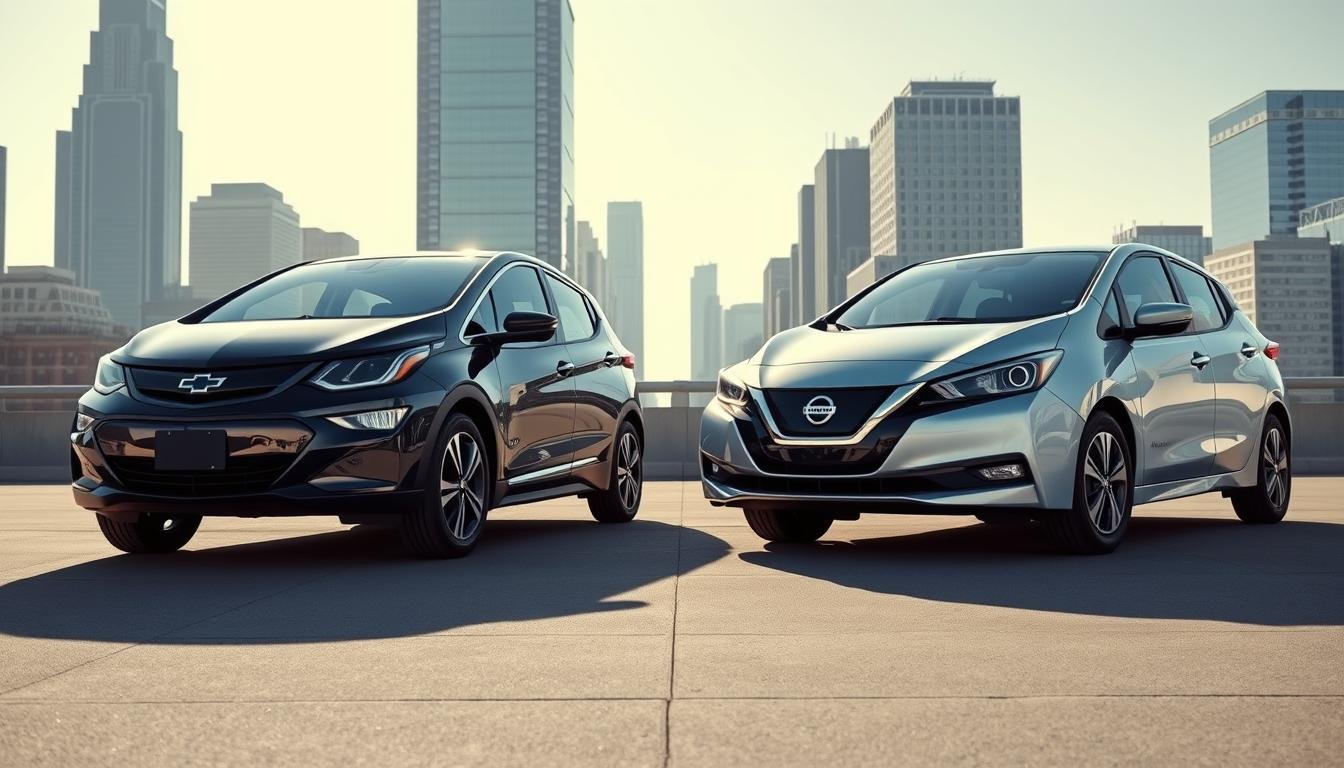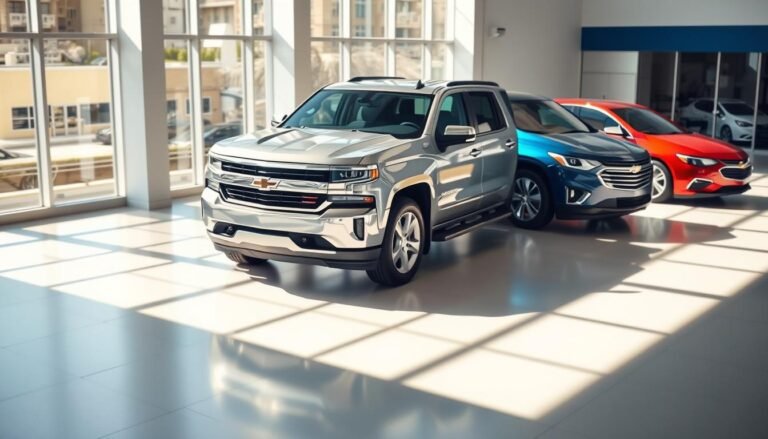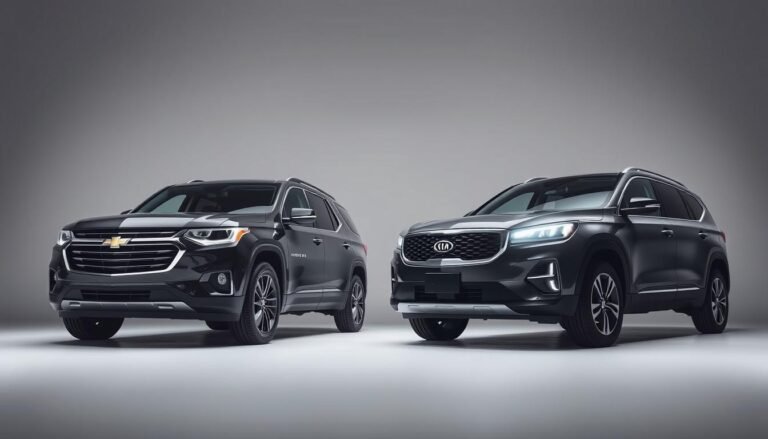Chevy Bolt vs Nissan Leaf: EV Showdown 2023
In 2023, the Chevy Bolt and Nissan Leaf stand out as top electric cars. If you’re looking for a green car, it’s key to know how these EVs differ.
This guide digs into the Chevy Bolt and Nissan Leaf, looking at their specs, performance, design, and what users think.
You’ll discover what’s unique about each car. Maybe it’s the Bolt’s classic hatchback look or the Leaf’s modern style.
We’ll discuss their battery life, comfort inside, and how they charge. This could change how you use them every day.
By the end, you’ll know which car matches your driving style and needs. Let’s check out which electric car could be your best choice in 2023!
Overview of Electric Vehicles in 2023
Electric vehicles are more popular now, thanks to new technology and a focus on the environment.
In 2023, you can choose from many cars, like the Chevy Bolt and Nissan Leaf. These cars are great for people who want to be kind to the planet and need a practical vehicle.
Looking at different electric cars, you’ll see they come with various features and capabilities.
Car companies keep making batteries better and cars can go farther on a single charge.
Reviews show you have lots of options, helping you find a car that suits your needs perfectly.
Chevy Bolt vs Nissan Leaf: Key Specifications
When looking at electric vehicles, we often focus on their performance and efficiency.
The Chevy Bolt and Nissan Leaf are two top choices in the electric vehicle (EV) market. Here are the key stats for each car.
Performance Metrics
The 2023 Nissan Leaf offers a strong 214 horsepower engine. It can go from 0-60 mph in only 6.3 seconds. Meanwhile, the Chevy Bolt has a 200 horsepower engine.
Its 0-60 mph time is slightly slower at 6.5 seconds. These figures show how quick and responsive both cars are, fitting different driving tastes.
Battery and Range Options
The battery size and range are crucial for electric cars. The Nissan Leaf has two battery options.
One is a 40 kWh battery for about 149 miles. The other, in the Leaf Plus, is a 62 kWh battery with a 226 miles range.
The Chevy Bolt features a 66 kWh battery. This gives it an impressive range of 259 miles, which is great for reducing range anxiety.
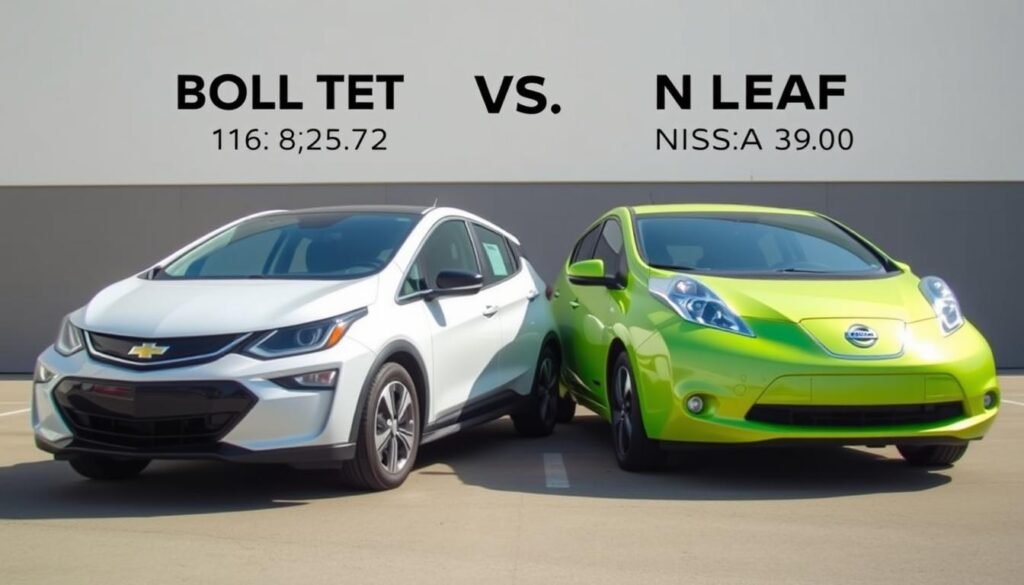
Exterior Design Comparison
The look of electric cars is key in winning over those who care for the environment. The Nissan Leaf and Chevy Bolt stand out in how they look.
They each choose styles that show off either new-age beauty or the usual hatchback usefulness.
Nissan Leaf’s Futuristic Appeal
The Nissan Leaf sports a smooth, air-cutting shape that makes it different from normal cars. It has a special V-motion grille and lights shaped like boomerangs for a fresh feel.
These details shout “I’m eco-friendly,” and draw in people who want cleaner transport options.
It’s clear in its design that the Leaf is more than just a car. It’s part of a bigger movement towards saving our planet.
Chevy Bolt’s Traditional Hatchback Style
On the other side, the Chevy Bolt sticks to a classic hatchback look. It’s compact and has gentle curves.
It mixes well-known Chevy traits with this shape, appealing to those who like something familiar.
Its design cleverly combines old-school looks with new features. This mix makes it hit the right note with many who are into eco-friendly cars.
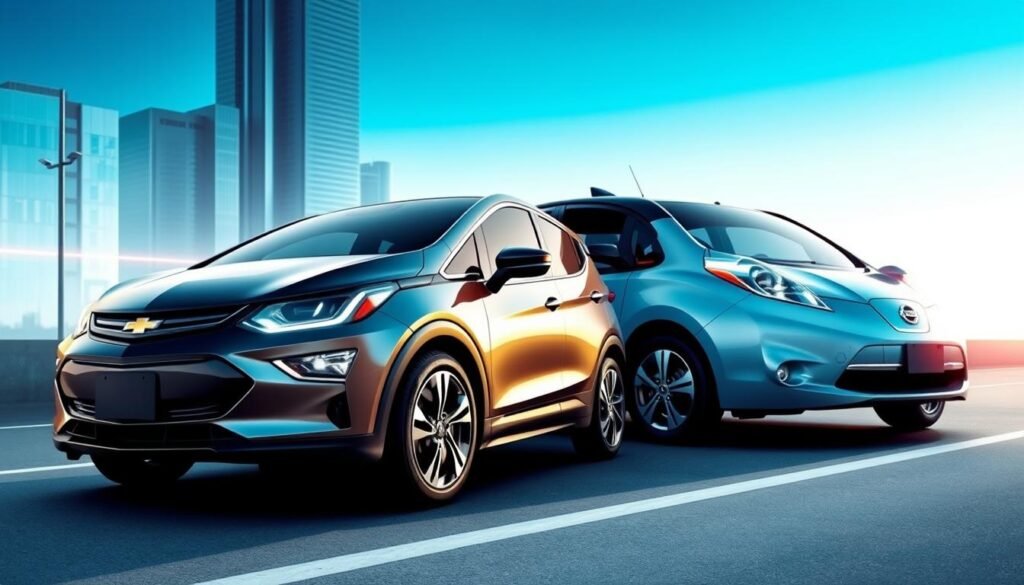
Interior Features and Comfort
The design inside electric cars matters a lot for the driving feel. Comfort and ease of use are key for happiness with the car.
Both the Nissan Leaf and the Chevy Bolt have great interiors that focus on comfort. They think about the space for passengers and their things.
Nissan Leaf’s User-Friendly Layout
The Nissan Leaf puts a big focus on comfort and a modern look. The dashboard is designed to be easy to use, making controls and info simple to get to.
There’s a lot of legroom in the back, which makes it great for long rides. The e-Pedal feature lets the driver speed up and stop with just one pedal. This makes driving simpler and more fun.
Chevy Bolt’s Infotainment and Space
The Chevy Bolt has a roomy interior with high-quality stuff and a neat look. Its big 10.2-inch infotainment screen makes using its features easy.
The design without a middle hump increases room for stuff. This makes it great for families or people going on trips.
This design in the Chevy Bolt means you can bring what you need easily. It does all this without losing out on comfort.
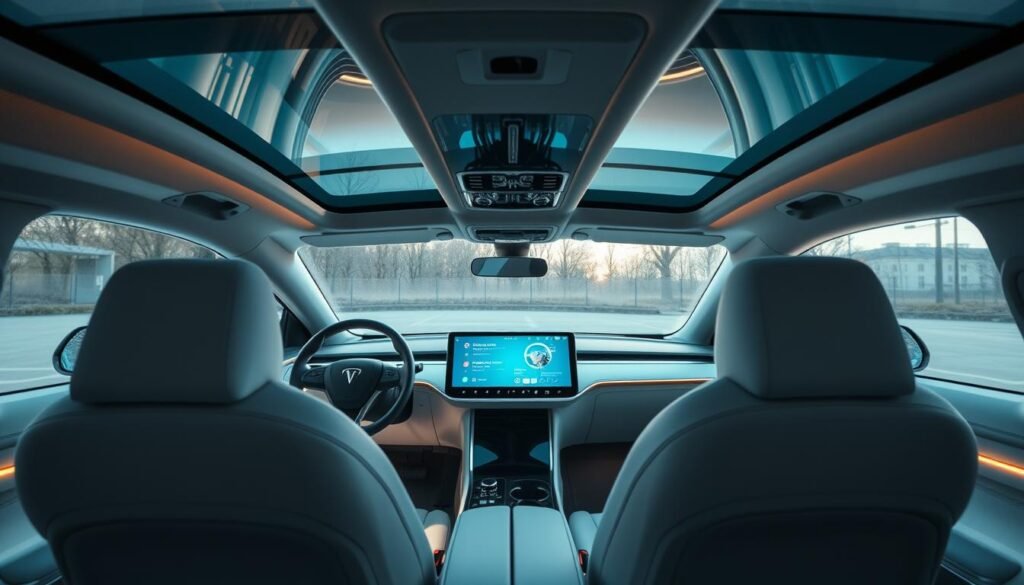
| Feature | Nissan Leaf | Chevy Bolt |
|---|---|---|
| Dashboard Layout | User-friendly, modern design | Sleek, intuitive touchscreen |
| Rear Legroom | Generous | Spacious |
| Infotainment Screen | Standard touchscreen | 10.2-inch touchscreen |
| Driving Feature | e-Pedal function | Flat floor design for storage |
Electric Car Efficiency and Performance
The Nissan Leaf and Chevy Bolt stand out in efficiency and performance among electric cars. This makes them top picks for those looking into EVs.
The Nissan Leaf offers smooth, easy driving thanks to its torque. Meanwhile, the Chevy Bolt brings fun to the drive with its quick response.
Both cars are great for saving money on daily drives and longer trips due to their efficiency.
The Leaf is designed to cut through the air better, improving range and saving energy.
The Bolt, however, is built for speed and control, giving you quick acceleration and precise handling.
Since the Leaf and Bolt have different strengths, trying them both is wise. This way, you can see which one you prefer driving.
Their efficiency is good for the planet and makes driving better for you.
Charging Capabilities of Each Model
The charging skills of the Chevy Bolt and Nissan Leaf matter a lot when choosing. They both support AC and DC charging, fitting different charging needs.
Knowing their performance helps pick the best electric car for you.
DC and AC Charging Specifications
The Leaf and the Bolt offer good options for DC and AC charging. The Nissan Leaf uses a CHAdeMO connector for fast DC charging, going up to 50 kW.
The Chevy Bolt uses a CCS connector and charges up to 55 kW. This makes them flexible for various charging spots.
Charging Times Comparison
Charging times are key for daily use of electric cars. Both cars can charge from 10% to 80% in about 60 minutes with DC stations.
This shows how public charging is getting better. For AC charging, it takes longer, around 7 to 9 hours for a full charge, depending on the charger.
This is good to know when thinking about buying one of these cars.
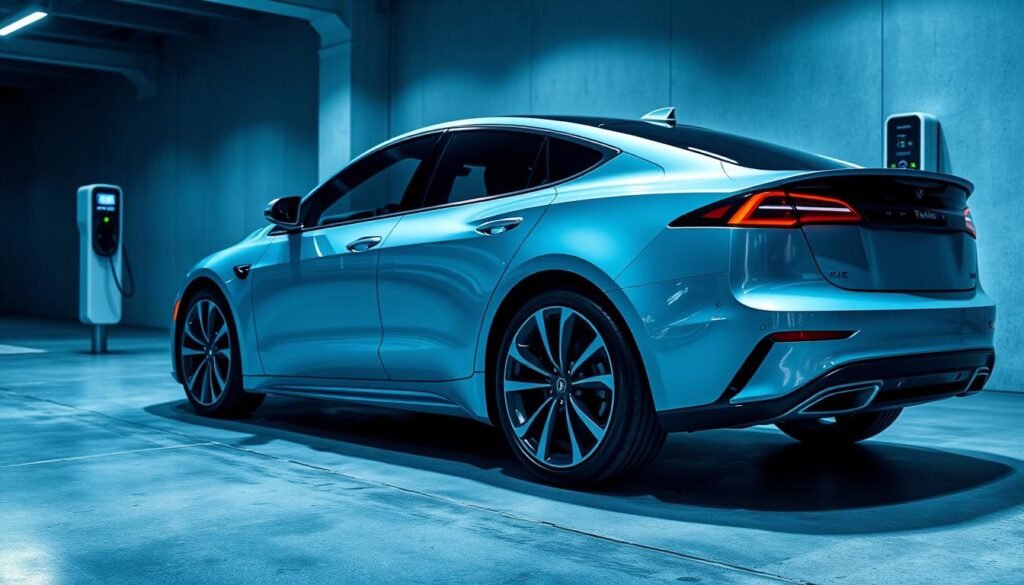
Pricing and Value For Money
The Nissan Leaf and Chevrolet Bolt are in a tight race for buyers. The Leaf has varied prices, depending on the battery size and extra features.
This makes it a good fit for many budgets. The Bolt, on the other hand, is priced well, especially when you consider its tech and features.
Looking at the cost of owning an electric car, think about the savings down the road. Both the Leaf and the Bolt are stars at saving you money on gas and upkeep.
The first cost might look big, but you’ll see the real benefit when you spend less on running the car.
| Model | Starting Price | Estimated Annual Fuel Savings | Value for Money Rating |
|---|---|---|---|
| Nissan Leaf | $27,000 | $1,200 | 8/10 |
| Chevrolet Bolt | $26,500 | $1,300 | 9/10 |
Real-World User Experience and Reviews
Users share their thoughts on the Nissan Leaf and Chevy Bolt in real-life settings. The Nissan Leaf gets high marks for being roomy and easy to use, making it great for families.
It has a big back seat and lots of space for stuff. The Chevy Bolt shines with its long driving range and zippy feel.
People like its quick start and smooth ride, comparing it to regular gas cars. However, some point out that the Leaf has better features standard, unlike the Bolt’s pricier options.
Each car has its own perks. The Leaf is perfect for city trips because it’s easy to drive around.
The Bolt, however, is the go-to for longer drives with its extensive range. Reviews give a fair look at what each car does best and where they could improve.
Chevy Bolt vs Nissan Leaf: Final Verdict
After comparing the Chevy Bolt and Nissan Leaf, it’s clear each has its strengths. The Chevy Bolt shines with longer range and faster performance.
This makes it great for those who want speed and efficiency. Meanwhile, the Nissan Leaf offers more room inside and comes with ProPILOT Assist for safer driving.
Choosing depends on what matters more to you. If it’s range and speed, go for the Chevy Bolt.
If you want a spacious car with the latest safety tech, the Nissan Leaf is a good choice.
Think about what you need regarding budget, performance, and looks to make the right decision.
Conclusion
The Chevy Bolt and Nissan Leaf are top eco-friendly cars in 2023. They offer unique benefits for those who care about the planet.
The Bolt has a big interior and great tech, whereas the Leaf looks sleek and is easy to use. Both are great choices in today’s market.
Tesla is still a big player in electric vehicles (EVs). But, the Bolt and Leaf show that having choices is key. Think about what fits your driving style and budget.
Choose a car that matches your needs and what you want in life. This ensures you’ll be happy with your car for many years.
When looking at these electric cars, think about what’s important to you. Making the right choice between the Chevy Bolt and Nissan Leaf can help our planet.
It’s all about picking a car that suits your needs and helps the environment too.
FAQs
What are the main differences in performance between the Chevy Bolt and Nissan Leaf?
The 2023 Nissan Leaf packs a 214 hp engine, sprinting from 0-60 mph in 6.3 seconds. The Chevy Bolt trails slightly with 200 hp, achieving 0-60 mph in 6.5 seconds.
How do the battery range options compare?
The Nissan Leaf comes with two batteries: a 40 kWh offering about 149 miles, and a 62 kWh version reaching up to 226 miles. Meanwhile, the Chevy Bolt features a 66 kWh battery that pushes its range to 259 miles.
Which vehicle has a more user-friendly interior layout?
The Nissan Leaf boasts a user-friendly dashboard and plenty of rear legroom, complete with an e-Pedal. On the other hand, the Chevy Bolt highlights its roomy interior, quality materials, and a larger 10.2-inch touchscreen.
How do the charging specifications differ between the two models?
Both cars support AC and DC charging, with the Leaf using a CHAdeMO connector up to 50 kW. The Bolt uses a CCS connector, allowing for up to 55 kW charging.
What are the estimated charging times for the Chevy Bolt and Nissan Leaf?
Each model can go from 10% to 80% charge in about 60 minutes at a DC charging station. Standard AC charging for either car usually ranges from 7-9 hours based on the charging rate.
How do the prices of the Nissan Leaf and Chevy Bolt compare?
Both cars are priced competitively. The Leaf’s price changes with battery size and added features, while the Bolt is known for its great value and advanced features.
What do real-world users say about the Nissan Leaf and Chevy Bolt?
Users like the Leaf for its space and easy-to-use features. The Bolt earns praise for its battery range and solid performance. Yet, some folks think the Leaf’s standard options don’t stack up to the Bolt’s higher-end features.
Which vehicle is better for eco-conscious buyers?
The Chevy Bolt and Nissan Leaf both appeal to eco-conscious drivers. They offer different strengths to match varied needs and driving styles.
How do I choose between the Chevy Bolt and Nissan Leaf for my specific needs?
When picking between the Chevy Bolt and Nissan Leaf, look at range, price, performance, and what you like design-wise. This will help find the right car for how you drive.

